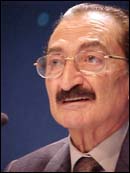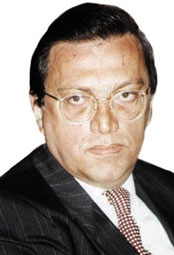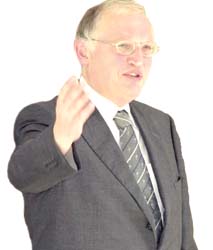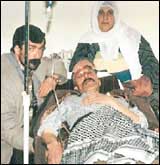25
July 2002
![]()
1. "Ecevit sees Turkey missing chance to advance EU bid", Turkish Prime Minister Bulent Ecevit said on Thursday that his country had wasted a chance to boost its struggling bid to join the European Union by calling early elections, planned for November.
2. "Political turmoil throws Turkey's EU bid into limbo", hopes faded on Wednesday for Turkey to advance its bid to join the European Union as political parties failed to agree to pass key democracy reforms before early polls in November. In what was seen as another blow to embattled Prime Minister Bulent Ecevit, the junior partner in his three-way coalition said it could not garner the necessary support to pass the reforms package before November.
3. "Time to act for Turkey's pretender", Election puts pressure on former minister Cem to reveal party's vision.
4. "Verheugen claims Cyprus issue may be solved before Copenhagen summit", Gunter Verheugen, member of the EU commission responsible for enlargement said that the Cyprus issue could be solved before the European Union Copenhagen summit in December.
5. "Turkey prepared for refugee influx from Iraq if US strikes", Turkey has contingency plans for a possible influx of refugees from Iraq if the United States launches a military offensive to oust Saddam Hussein, officials said on Wednesday.
6. "Almost fatal torture", Abdülaziz Dogan, a Kurdish young man, was almost fatally wounded due to the torture he had suffered at Zeytinburnu Merkez Efendi Police Station. He was released without being brought before a prosecution on the grounds of "vital threat". CTP: Steps are not sufficient.
1. - AFP - "Ecevit sees Turkey missing chance to advance EU bid":
ANKARA / 25 July 2002
Turkish Prime Minister Bulent Ecevit said on Thursday that his country
had wasted a chance to boost its struggling bid to join the European
Union by calling early elections, planned for November.
"Unfortunately, with early elections interfering, work concerning the EU will be hampered for some time," Ecevit told reporters. "This opportunity appears missed to some extent." Ecevit was speaking at Ankara airport on his way to a national security meeting in Istanbul, his first trip outside the capital since early May, when he was first hospitalized. "After deciding on early elections, it could become impossible to allocate enough time for other legislative work," Ecevit said.
Many doubt whether MPs would engage in what could be a lengthy process to pass laws related to the EU membership bid when they have to start election campaigns. Ecevit's statement reflected fears that Turkey's EU bid will be postponed indefinitely if the government does not get a date to begin negotiations on joining the bloc by the end of the year, when the EU is to outline accession calendars for the 13 countries seeking to join. Ankara's drive to catch up with EU democracy norms has been stuck since early May, when the 77-year-old Ecevit began absenting himself from official duties due to ill health and his far-right senior coalition partner blocked key democracy reforms.
The ensuing turmoil resulted in a mass exodus from Ecevit's party, removing the government's majority in parliament, and forced the prime minister to bring elections forward to November 3 from the original date of April 2004. The parliament convenes on Monday to ratify the election date, and Ecevit's other coalition ally, a junior pro-EU party, wants legislators to pass a package of EU-oriented reforms before ratifying the poll date, or at least before they fan out for electioneering.
The package envisages critical reforms such as the abolition
of the death penalty and legalizing courses and broadcasts in the language
of the country's sizeable Kurdish minority. ![]()
2. - AFP - "Political turmoil throws Turkey's EU bid into limbo":
ANKARA / 24 July 2002 / by Sibel Utku
Hopes faded on Wednesday for Turkey to advance its bid to join the
European Union as political parties failed to agree to pass key democracy
reforms before early polls in November. In what was seen as another
blow to embattled Prime Minister Bulent Ecevit, the junior partner in
his three-way coalition said it could not garner the necessary support
to pass the reforms package before November.
"I have to admit that... I do not see the unconditional support parties have promised for the reforms," Mesut Yilmaz of the Motherland Party (ANAP) told reporters after talks with coalition allies and opposition parties. "I have serious doubts over their sincerity. I hope those doubts will not come true and Turkey will not miss this historic opportunity," the deputy prime minister overseeing EU affairs said. Many fear Turkey's EU bid will be postponed indefinitely if crisis-hit Ankara does not get a date to begin negotiations on joining the bloc by the end of the year, when the EU will determine when the 13 countries cueing to join can do so.
"Things are quite mixed up," Foreign Minister Sukru Sina Gurel told CNBC-e television. The parliament convenes on Monday to ratify a decision to hold polls on November 3, which Ecevit was forced to call after mass defections ended his parliament majority. A rift over basic EU norms lies at the core of the political turmoil in Ankara, along with the 77-year-old Ecevit's inability to fully carry out his duties owing to ill health. The ANAP, with the support of numerous civic groups, wants legislators to pass thereforms -- such as the abolition of the death penatlty -- before ratifying the poll date, or at least before they fan out for electioneering. Many officials, among them Ecevit, have cast doubt on whether MPs would engage in what could be a lengthy legislative process when they have to start election campaigns.
Opposition support for the reforms is crucial, because Ecevit's senior partner and the largest force in parliament, the far-right Nationalist Action Party (MHP), is opposed to key EU norms such as the abolition of the death penalty and cultural freedoms for the sizable Kurdish minority. Opposition parties first supported the reforms, but soon, with an eye on the elections, attached strings to their pledges. The need to abolish the death penalty is a painful issue for Turkey, where many, including the MHP, want to see jailed Kurdish rebel leader Abdullah Ocalan, the country's number one public enemy, executed.
The MHP also argues that other reforms in the package proposed by Yilmaz -- namely the legalization of Kurdish-language courses and broadcasts -- will encourage separatism at a time when a Kurdish rebellion in southeast Turkey has quieted down. Yilmaz said Turkey's EU intergration process was "the most important project" in the history of the mainly Muslim but staunchly pro-western nation. "Starting accession talks with the EU is vital," he said, urging legislators to back the reforms when they are brought to parliament's agenda next week.
Brokers said the bickering over the reforms contributed
to a 4.1-percent fall at the Istanbul stock exchange on Wednesday. Investors
believe that starting accession talks with the EU will boost Turkey's
credibility and help lure foreign investment, seen as vital for the
sucess of an IMF-backed economic recovery program designed to drag the
country from one of its worst-ever recessions. ![]()
3. - The Guardian - "Time to act for Turkey's pretender":
Election puts pressure on former minister to reveal party's vision
ISTANBUL / 25 July 2002 / by Jonny Dymond 
Ismail Cem, the man who turned his back on Turkey's government to launch
his own campaign for power, is under growing pressure to put flesh on
the skeleton of his new party, as the parliament prepares to name a
date for a general election.
Parliament convenes to set the date on Monday, and it is two weeks since Mr Cem resigned from the government of the embattled prime minister, Bulent Ecevit.
The former foreign minister now has more than 60 MPs with him in his new party.
But the strain is beginning to tell; on Monday, when he registered his party, he dodged journalists in the parliament in Ankara. His aides said that he was tired and had run out of time, and Mr Cem, unusually, let himself be hustled away without even a smile.
Mr Cem is now the Turkish media darling. He is, for Turkey, a very modern politician, skilled in the art of communication. A former columnist on Cumhuriyet newspaper, at 34 he was the youngest-ever director of the state broadcasting system.
Educated at an exclusive Istanbul school, then in Lausanne and Paris, Mr Cem speaks fluent French and English, and he looks a decade or so younger than his 63 years.
His resignation two weeks ago was a political earthquake. He had been foreign minister for five years and had been in the shadow of his mentor, Mr Ecevit, for three decades.
The two have not spoken since the split.
But after the first flush of excitement about the creation of Mr Cem's party has faded, hard questions still need to be answered.
When he announced the creation of Yeni Turkiye (New Turkey), Mr Cem said the party would be based on social democratic principles and would push aggressively for membership of the EU.
In an interview with the Guardian, Mr Cem said his first concern was the economy. Interest rates have risen sharply during the political turmoil whilse the Turkish lira has plunged.
"The real economy is moving well, according to the statistics," he said. "But it is still at a delicate stage. Only after the election will it become firmer."
Other analysts are not so sure. Emin Ozturk, chief economist of Bender Securities in Istanbul, said: "The problem is not how delicate it is now, but how long it will stay this delicate. A strong and stable government could see lower interest rates, but to be successful Cem's party would need to get support from the large middle ground - and there are little bits and pieces indicating that it will not gather that support."
The centre-left is a crowded place. Mr Cem needs to attract the swing voters of the centre and the centre-right - so after the first commitment to social democracy, some tweaks have been made to the message.
In an attempt to appeal to conservative voters he has made it clear that he has no problem with the wearing of headscarves, an issue that has become a flashpoint in secular Turkey's battle with fundamentalism.
On some crucial foreign policy issues, however, he has remained silent.
The US is keen to get Turkey's cooperation with any military action in Iraq. But Mr Cem will not make his feelings on that issue known. Most observers believe that he shares the present government's deep misgivings about any US action.
"If you ask anyone in politics," says Iltur Turan, a professor of political science at Istanbul's Bilgi University, "none of them deviate from what's been expressed already."
But Mr Cem spoke up for the US military in Turkey during the war in Kosovo, urging Mr Ecevit to allow American jets to bomb Serbia from Turkish bases. He may prove to be more compliant with Washington than the current government is on the subject of Iraq.
For Mr Cem however, Turkey's primary foreign policy goal is membership of the EU; Iraq is just a distraction.
Turkey needs to implement human rights reforms to be considered for membership negotiations at the Copenhagen summit at the end of the year.
"It can be done," Mr Cem said. "I established the infrastructure, so if there is any possibility [of joining the EU], as a government we'd be in a good position. But objectively I think it's very difficult."
If Turkey's bid for membership is denied even a hearing at Copenhagen, Mr Cem's work as foreign minister will be undone. The voters of Turkey would probably then turn on the leaders who put too much trust in Europe.
As Mr Cem admits, if Turkey is to achieve its goal there
is an "enormous task" ahead. ![]()
4. - Turkish Daily News - "Verheugen claims Cyprus issue may be solved before Copenhagen summit":
ANKARA / 25 July 2002
Gunter Verheugen, member of the EU commission responsible for enlargement
said that the Cyprus issue could be solved before the European Union
Copenhagen summit in December.
Verheugen said German weekly Die Zeit said, "Turkey may come with a new proposal regarding the Cyprus issue in order to get a political advantage."
Verheugen stated that starting membership negotiations with Turkey is possible in the short term but must add some important conditions to the negotiations that are not existing now and added, "The constitutional amendments in Turkey should be put into effect."
Saying that the political developments in Turkey did not
endanger the reform process, Verheugen emphasized that the negotiations
regarding the enlargement of the EU was completed to a great degree,
and added, "We've solved 95 percent of our problems." ![]()
5. - AFP - "Turkey prepared for refugee influx from Iraq if US strikes":
ANKARA / 24 July 2002
Turkey has contingency plans for a possible influx of refugees from
Iraq if the United States launches a military offensive to oust Saddam
Hussein, officials said on Wednesday.
"In all the border regions we have always been prepared ever since 1990 when the country was caught unprepared," Huseyin Baskaya, the governor of Sirnak province bordering Iraq, told AFP by telephone. The official was referring to the Gulf War, after which several hundred thousand Iraqi Kurds flooded across the border into Turkey as they fled an Iraqi military crackdown on a Kurdish rebellion in northern Iraq.
"We have plans concerning accommodation and other services, and these are not only for refugees but also for natural disasters," Baskaya said. The governor denied media reports that Turkish authorities had already started building tent cities in areas along the Iraqi border in the province.
US Deputy Defense Secretary Paul Wolfowitz held talks with Turkish leaders in Ankara last week in a bid to garner support from a key NATO ally for its plans to topple the Baghdad regime, increasing speculation that a US strike could be imminent.
Turkey is home to a US base, from where US jets launched strikes against Baghdad in the 1991 Gulf War and which they still use to enforce a no-fly zone to protect the Kurds in northern Iraq. An official from the UN office in Ankara also said that they had prepared contingency humanitarian plans against "any possibility regarding Iraq."
"As the possibilities increase, we are revising and developing those plans," he added. Turkey, engulfed in a severe government crisis and economic hardship, is against a military operation against Iraq, fearing political and economic fallout.
Ankara worries that a military operation may help the
Kurds in northern Iraq -- who have been outside of Baghdad's control
since the 1991 Gulf War -- to set up an independent state, which could
in turn rekindle a recently subdued Kurdish rebellion in southeast Turkey.
Ankara estimates it has lost some 40 billion dollars (euros) as a result
of trade sanctions against Baghdad. ![]()
6. - Kurdish Observer - "Almost fatal torture":
Abdülaziz Dogan, a Kurdish young man, was almost fatally wounded due to the torture he had suffered at Zeytinburnu Merkez Efendi Police Station. He was released without being brought before a prosecution on the grounds of "vital threat".
MHA / ISTANBUL 
Abdulaziz Dogan was released from Merkez Efendi Police Station in
Zeytinburnu, Istanbul without even being brought before a prosecutor
after his health worsened due to the torture he had suffered under detention.
A report issued by Bakirköy stated that Abdulaziz Dogan was under
"vital threat" and he was given a medical report saying that
he could not work for 25 days.
On July 15, 2002 a number of people were detained after a police raid on a house in Yesiltepe, Zeytinburnu and taken to the Merkez Efendi Police Station. The police claimed that the detainees shouted slogans praising KADEK whereas the quarter's inhabitants said that there was a quarrel between "Kurds and Albanians". Abdulaziz Dogan, one of the detainees, was taken to Haseki Hospital on July 15 and then Yedikule Hospital on July 16. Following the medical report issued by both hospitals Bakirkoy Forensic Medicine sent a report to Bakirkoy Public Prosecutor, saying that he was under vital threat.
He was released lest he would die under detention
Abdulaziz Dogan was released from the police station without even being brought before a prosecutor. Ramazan Celik (23), Sukru Oran (18) and Esref Adak (19) who were also detained together with Dogan were given medical reports saying that they suffered torture. The reports stated that both three people had injures in their bodies but there were no vital threat.
Adak, Oran and Celik were put into Metris Prison whereas Dogan was released. Gulden Sonmez, one of the lawyers of Mazlum-Der (Association of Human Rights and Solidarity for Oppressed People) who met with the prisoners in Metris Prison made a statement on the matter saying the following: "One of them had bruise in one of his eyes and the eye was bloodshot, bruises on his hands, arms and face. He complained about violent stomach ache. He said this was due to the kicks on his stomach. And his feet turned purple and throbbed with pain. He said that there were also bruises and pain on his back, legs and sides. One of them had his head beaten by truncheons and there was rupture in his had. I saw a number of injures and bruises on his hands, arms, face too. One of them had his lip sown. "
CTP: Steps are not sufficient
A delegation from the European Committee Against Torture and Ill Treatment (CPT) released his report relating with police stations and prisons in Sincan and Amed they visited in order to get information about human rights in the country new legal adjustments on the duration of detention between 21 and 27 March 2002. CPT considered unlimited visits from families and common activities between prisoners in Sincan F-Type (Cell Type) Prison a positive step. But the report stated that a majority of the prisoners convicted under Anti-Terror Law rejected to participate in the common activities and asked for the Turkish government to find a solution.
On the other hand the government, while not replying the
questions of CPT delegation about the torture in gendarme station at
Amed-Elazig road, stated that Gendarme General Command planned to record
the interrogations audio-visually. The officials also pointed out that
they would make changes legally in the detention conditions. ![]()